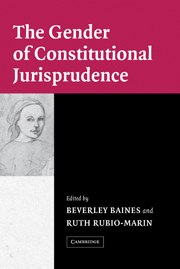Book contents
- Frontmatter
- Contents
- List of Contributors
- Acknowledgments
- The Gender of Constitutional Jurisprudence
- Introduction: Toward a Feminist Constitutional Agenda
- 1 Speaking into a Silence: Embedded Constitutionalism, the Australian Constitution, and the Rights of Women
- 2 Using the Canadian Charter of Rights and Freedoms to Constitute Women
- 3 Emancipatory Equality: Gender Jurisprudence under the Colombian Constitution
- 4 Gender Equality and International Human Rights in Costa Rican Constitutional Jurisprudence
- 5 Constituting Women: The French Ways
- 6 Gender in the German Constitution
- 7 India, Sex Equality, and Constitutional Law
- 8 Constitutional Transformation, Gender Equality, and Religious/National Conflict in Israel: Tentative Progress through the Obstacle Course
- 9 “No Nation Can Be Free When One Half of It Is Enslaved”: Constitutional Equality for Women in South Africa
- 10 Engendering the Constitution: The Spanish Experience
- 11 Gender Equality from a Constitutional Perspective: The Case of Turkey
- 12 Gender and the United States Constitution: Equal Protection, Privacy, and Federalism
- Index
- References
11 - Gender Equality from a Constitutional Perspective: The Case of Turkey
Published online by Cambridge University Press: 14 January 2010
- Frontmatter
- Contents
- List of Contributors
- Acknowledgments
- The Gender of Constitutional Jurisprudence
- Introduction: Toward a Feminist Constitutional Agenda
- 1 Speaking into a Silence: Embedded Constitutionalism, the Australian Constitution, and the Rights of Women
- 2 Using the Canadian Charter of Rights and Freedoms to Constitute Women
- 3 Emancipatory Equality: Gender Jurisprudence under the Colombian Constitution
- 4 Gender Equality and International Human Rights in Costa Rican Constitutional Jurisprudence
- 5 Constituting Women: The French Ways
- 6 Gender in the German Constitution
- 7 India, Sex Equality, and Constitutional Law
- 8 Constitutional Transformation, Gender Equality, and Religious/National Conflict in Israel: Tentative Progress through the Obstacle Course
- 9 “No Nation Can Be Free When One Half of It Is Enslaved”: Constitutional Equality for Women in South Africa
- 10 Engendering the Constitution: The Spanish Experience
- 11 Gender Equality from a Constitutional Perspective: The Case of Turkey
- 12 Gender and the United States Constitution: Equal Protection, Privacy, and Federalism
- Index
- References
Summary
POINT OF DEPARTURE
The Modernization Project of Turkey and the Identity of Women as Political Agents
Turkey, a bridge connecting Asia and Europe, occupies the geographic border zone between two vastly different regions of the world: the East and the West. This gives Turkey a unique position, as it has cultural, social, and legal characteristics of both regions and tries to achieve the values of both in its current search for identity. This makes it difficult and puzzling to evaluate the status of women in Turkey.
Although 98 percent of its population is Muslim, Turkey has had no state religion since 1924, when the Constitution defined the country as “secular.” Indeed, Turkey's commitment to Western values was so widely accepted that, after September 11, many mainstream Western media reports did not even include Turkey on their lists of Muslim countries. Many journalistic articles in the United States and elsewhere advance the view that Turkey is the only modern, democratic Muslim society, a model for the rest of the Islamic world. This interpretation is quite understandable, considering that in the early 1920s, among other reforms, Turkey changed its entire legal system from the Islamic Shari-a to the Continental European system, in effect adopting a Western secular order.
This abrupt transition had a strong impact on the status of Turkish women. Since the creation of the modern Turkish Republic in 1923, the ultimate aim of the founders has been to gain acceptance among the European states.
- Type
- Chapter
- Information
- The Gender of Constitutional Jurisprudence , pp. 278 - 305Publisher: Cambridge University PressPrint publication year: 2004



